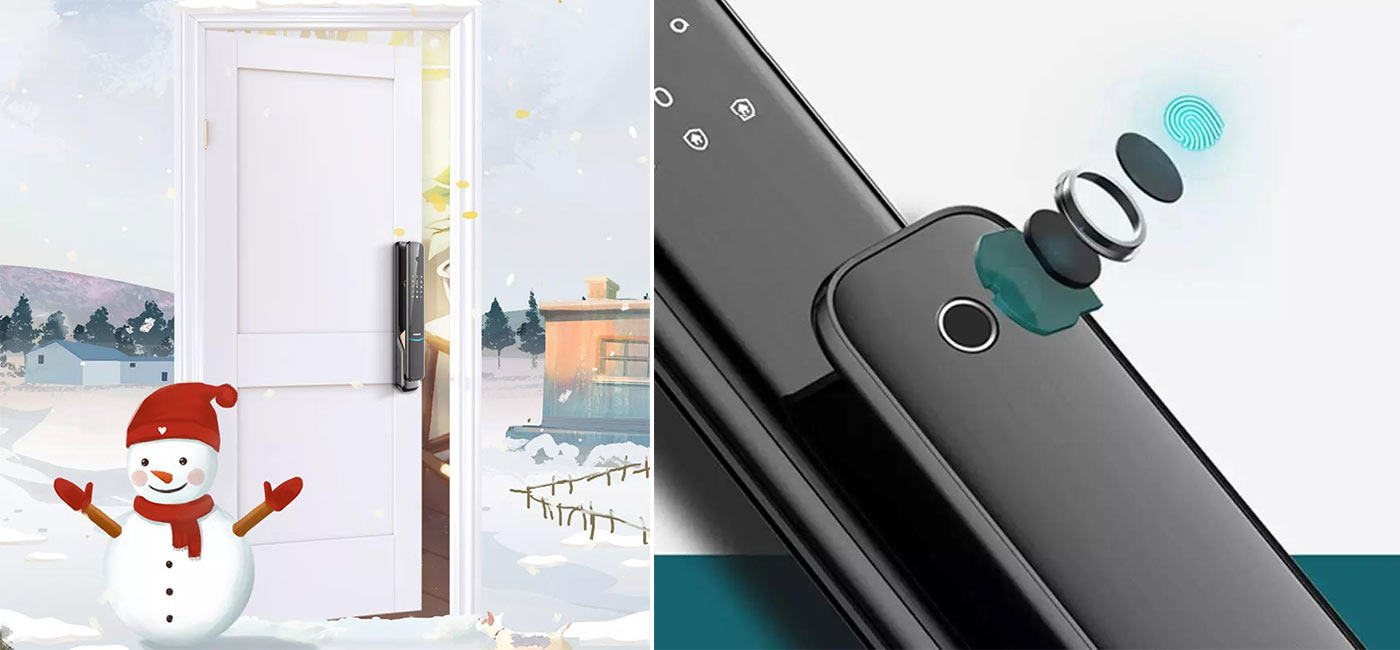Home > Community > Blog > The fingerprint sensor not sensitive in cold weather? Here are the reasons
In the freezing winter, some would believe that the smart door lock becomes insensitive when the weather gets colder. The smart door lock is an electronic security product at the entrance. Will it affect by the temperature? What factors can cause the smart lock to malfunction? Let’s find the answer!
Temperature affects battery capacity
No matter it is a dry battery or a lithium battery, the battery capacity would be reduced due to the low-temperature environment. Moreover, the chemical reaction speed of the battery would also slow, resulting in a decrease in the battery discharge capacity. If it can not reach the normal range, it will lead to battery short using lifespan and faster power consumption.
Compared with ordinary dry batteries, alkaline dry batteries have a higher capacity. Its chemical substances in the batteries are fixed, and less affected by low temperature. Therefore, for ordinary smart door locks, we'd better choose AA alkaline dry batteries.
However, if it is a video smart door lock with a camera, electronic doorbell, or video functions, it is usually equipped with a higher capacity density and rechargeable lithium battery. Because it has higher requirements on battery capacity and its service time. Philips EasyKey is no exception as well.
In addition to choosing the appropriate battery for the smart door lock, we must also develop the habit of checking the battery level regularly to ensure the normal use of the smart door lock. The Philips EasyKey has a low battery alert function. When its battery level is less than 20%, the smart door lock would prompt "low battery level, please replace the battery" and remind you to replace it in time.
Condensation causes battery short circuit
The battery compartment of most smart door locks is located on the back escutcheon. When the indoor temperature and humidity are relatively high, but the outdoor temperature is relatively low. if there has too much cold air indoors at this time, the back escutcheon would easily condense water droplets. As a result, it is easy to cause battery short circuit, thereby affecting the normal use of the smart door lock.
Therefore, when the temperature drops significantly, it had better close the doors and windows when we are going out to reduce indoor cold air. Besides, we should properly open windows for ventilation to reduce indoor humidity when we are at home.
To reduce the impact of condensed water on the battery, the battery compartment of most Philips EasyKey adopts an independent closed double-layer protection design. In addition to the battery cover, there still has an interlayer inside, which can fix the battery, and also wrap it in all directions. In this way, the battery can effectively reduce the impact of condensed water on battery lifespan.
Dry skin leads to insensitive fingerprints recognition
The climate in winter is very cold and dry. Sometimes, the temperature is too low to recognize the fingerprint. Or it would probably also cause skin peeling and insensitive recognition in dry weather.

The Philips EasyKey employs a semiconductor fingerprint sensor with high recognition sensitivity. It can not only collect finer fingerprint details through the skin epidermis, but also has a fingerprint authentication and repair function. If the finger is only slightly worn or peeled, the fingerprint sensor can restore part of the damage and blurred fingerprint images, which would not affect fingerprint recognition.
If the fingerprints are peeled off or damaged severely, we can enter a few more fingerprints for backup. If your fingers do not peel or damage, but still can not recognize by the senor. The reason might be there is dirt in the fingerprint collection window. We can wipe it gently with a dry soft cloth.
The above are the main reasons for "the smart door lock does not react quickly enough in winter when we are unlocking the door". If the above factors are excluded, the smart door lock would still appear the following malfunctions. For example, the fingerprint recognition is insensitive, or the latch bolt could not fully pop out, or you can not pull out the mechanical key successfully. Please do not spray lubricating oil by yourself. Contact the brand’s official after-sales services or ask an installer for on-site adjustment in time.
Philips EasyKey after-sales service hotline is always ready for troubleshooting, leaving you more reassurance in your daily use.